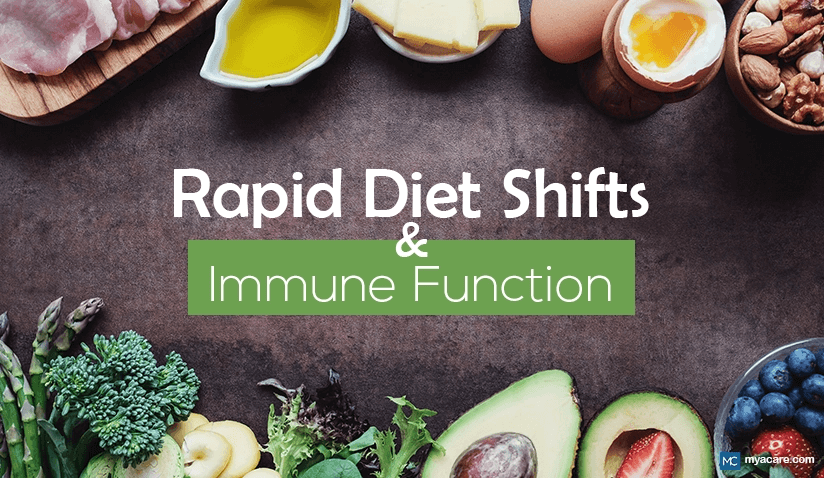Understanding the Link Between Diet Shifts and Immune Function

Medically Reviewed by Dr. Rosmy Barrios - September 30, 2024
In recent years, there has been a surge in the popularity of both vegan and ketogenic diets.
- The ketogenic diet reduces carb intake and radically increases fat consumption to burn fat for energy instead of glucose, achieving a state of ketosis[1]. It is also famous for weight loss, improved metabolic health, slowing some cases of neurodegeneration, and aiding those with epilepsy.
- A vegan diet eliminates all animal products. It is associated with numerous health benefits, such as lowering heart disease risk, enhancing digestion, and aiding in weight loss.[2]
While these diets have been praised for their health benefits, new research shows that they each impact the immune system positively and negatively when transitioning.
The similarities and differences between the two diets overturn previous misconceptions, such as the positive influence of going vegan on red blood cell production and the benefits of keto for reducing the risk of cancer.
This article weighs the effects of rapidly switching to vegan or keto diets on the immune system and provides insights on maintaining a healthy immune system while following these diets.
Immune Effects of Rapid Dietary Transitioning
In a study conducted by researchers at the NIH Metabolic Clinical Research Unit, 20 participants changed their eating patterns to either a ketogenic or vegan diet for two weeks before reverting to their original diets.
The results primarily revealed that rapidly transitioning to either of the diets caused the immune system to become more active irrespective of the order or type of foods consumed specific to either diet. This research potentially explains the 'flu-like' symptoms people often complain about when transitioning to a different diet, usually attributed to detoxing and shifting the metabolism.
The way each diet affected overall immune function differed between diet groups, and these changes were attributable to metabolic differences, as briefly discussed below.[3]
It is still unclear whether these changes were due to the diet change itself or a sudden reduction in the intake of highly processed food, typical of a standard Western diet. Further research can clarify the study results and improve our understanding of nutrition and health.
Vegan Diet
The vegan diet in the study opted for a ratio of 75% carbs to 10% fats (the inverse ratio used by the keto diet participants).
In the study, the vegan diet triggered a heightened immune response provoked by the innate immune system. The innate immune system is the passive wing of the immune system and the body's primary defense against harmful pathogens. It includes localized cell responses, non-immune cell defenses, and probiotic bacterial responses housed in the gut microbiome.
The increase in innate immunity during a vegan diet was speculated to be chiefly propelled by neutrophils, white blood cells concerned with initiating wound repair. The immune response to the vegan diet included an increase in type I interferons, which are noteworthy antiviral cytokines (immune signaling chemicals).
Other significant results reveal the following about starting a vegan diet:
- Red Blood Cells: The vegan diet had a higher overall dietary iron intake than the ketogenic diet. The increase in iron consumption leads to a higher production of red blood cells and heme, a protein that allows these cells to carry more oxygen.
- Malignancy: Pathways involved in cancerous growth also increased during the transition to the vegan diet. While the transition to either diet increased these pathways, 242 of the ones tested in the study were active, compared to only 66 related to the keto diet. More evidence is needed to confirm what these results mean, especially as many plant-based foods present potential anticancer benefits.[4]
- Enhanced Microbial Diversity: Out of the friendly gut bacteria tested, 18 of 26 species levels increased in those on a vegan diet, especially in the Firmicutes phylum. This activity correlated with increased enzymes from bacteria feeding on plant-based starches. These bacteria can also improve the levels of gut-derived short-chain fatty acids like butyrate.
- Liver Proteins: The vegan diet heightened alanine, aspartate, and glutamate metabolism and arginine production. These indicate an increase in liver activity during the transition phase.
- Unsaturated Fat Intake: Vegan dieters displayed a higher level of unsaturated fat metabolism, correlating to their dietary intake. This result suggests favorable cardiovascular benefits of the vegan diet.[5]
- Metabolic Shift: Compared to the baseline diet, the metabolic shift towards a vegan diet was less radical than that of a ketogenic diet, indicating a more gentle transition.
According to these findings, transitioning to a vegan diet may be easier to implement, improve cardiovascular health, and enhance immunity towards viral infections.
Despite the benefits, there is still the potential for risks in the vegan diet. A vegan diet consisting of processed foods and lacking essential nutrients can unbalance the immune system and increase the risk of chronic disease. The outcome depends on the quality of the diet.
For example, other research shows that an unbalanced firmicutes to Bacteroidetes ratio can raise the risk of obesity, possibly related to the effect of starch on blood glucose levels. Selecting low to medium GI foods rich in antioxidants and fiber can help improve the ratio and maintain healthy blood glucose levels. Probiotics also help to keep the correct balance of gut bacteria.
Another concern is the risk of vitamin B12 deficiency[6]. Despite iron-related improvements in red blood cell production, the vegan diet may raise the risk of vitamin B12 deficiency, leading to anemia and lower immune function. Other micronutrients possibly lacking on a vegan diet include zinc, selenium, and calcium.[7]
Ketogenic Diet
The ketogenic diet consumed by study participants included 76% fat and 10% carb intake.
In contrast to the vegan diet in the study, the ketogenic diet primarily activated the adaptive immune system, the active arm of the immune system responsible for initiating immune attacks against specific pathogens. A higher level of T cells, B cells, and natural killer cells emphasized this activation.
Oxidative phosphorylation, a crucial pathway associated with T cell activation and memory formation, showed significant enrichment in the ketogenic diet compared to a vegan or baseline diet. Fat burning can increase the activity of this pathway.
Other findings suggest the following:
- Lower Insulin Signaling: The ketogenic diet influences proteins from the blood, brain, bone marrow, liver, and lymphatics system, particularly affecting those involved in immunity and glucose metabolism. It specifically lowered the expression of proteins related to insulin signaling. These changes affected women more than men.
- Branched Chain Amino Acids Metabolism: It encourages the metabolism of valine, leucine, and isoleucine (BCAAs), caused by a higher dietary intake of these proteins. BCAAs may increase harmful by-products, insulin resistance, and the risk of diabetes mellitus in the absence of a regular exercise routine[8] or when coupled with a high-calorie intake[9] (as seen in the keto diet). More research is required to confirm these observations.
- Saturated Fat Enrichment: More saturated fats were consumed on the ketogenic diet, leading to a higher enrichment in the body. These results indicate a higher consumption of animal products and a potentially less favorable cardiovascular profile in the long run.[10]
- Lower Microbiome Diversity: The ketogenic diet caused the level of beneficial gut bacteria to decrease, reducing the production of essential vitamins and proteins. This finding correlates with the higher protein intake of the diet. Previous studies suggest that the keto diet raises bile-tolerant bacteria and lowers fiber-dependent bacteria that regulate inflammation. The study's immune system findings align with previous studies linking reduced gut bacteria diversity to increased body inflammation and elevated disease risk.[11]
- Greater Metabolic Disturbance: The ketogenic diet induced more than five times the amount of metabolic changes in the participants than the vegan diet, compared to the participants' baseline. This more prominent shift is perhaps where the keto diet became famous for symptoms during the transition phase, known as the 'keto flu.'[12]
The overall results suggest that the keto diet induces a dramatic shift that may impose a less smooth transition and pose long-term health risks.
- In the short term, the keto diet boosts immune function and fat burning and lowers insulin levels.
- In the long term, it may increase the risk of cardiovascular disease, diabetes, and digestive disorders, especially without plenty of physical activity to balance the calorie intake.
It is important to concentrate on healthy fats such as avocados, olive oil, and nuts, exercise regularly, and supplement any nutrients necessary to support a healthy immune system.
Maintaining a Healthy Immune System on Vegan or Keto Diets
It is essential to plan before starting any new diet plan to minimize any side effects.
Consuming nutrient-dense foods to support a healthy immune system is important regardless of your diet. Regularly include a variety of prebiotic fruits, vegetables, whole grains, and nutritious fats in your diet for overall success.
Anti-inflammatory foods, herbs, and spices, such as ginger, can help regulate the immune system's negative impact when transitioning to a new diet.
Some other points to remember while transitioning:
Supplementation: Rapidly switching to a new diet can often lead to nutrient deficiencies, negatively affecting overall health and well-being. Supplementing vitamins and minerals is crucial to maintaining a healthy immune system.
- For vegans, this may include vitamin B12, zinc, and selenium supplementation.
- For those following a ketogenic diet, it may include magnesium, potassium, and vitamin D3.
Eat Enough: In some individuals, eating too few calories can lead to 'starvation mode,' causing a buildup of stress hormones that leads to excess weight gain and inflammation[13], as the body prepares for periods of starvation, the next time calorie consumption increases. Monitoring calorie intake and ensuring you consume enough to support your metabolism is essential.
Exercise: Regular exercise is crucial when opting for any diet plan, yet it plays an especially prominent role in managing the negative consequences of a keto diet. Moderate exercise helps to regulate immune function by increasing anti-inflammatory compounds and redistributing immune cells. These effects can ease a dietary transition after the initial detox phase has passed.
A qualified dietician or nutritionist can help you devise a smooth transition plan that helps to reduce the risks involved.
Conclusion
In conclusion, rapidly switching to vegan or ketogenic diets can have an impact on the immune system. It is essential to be aware of the potential dangers and take steps towards maintaining a healthy immune system while following these diets.
By focusing on nutrient-dense foods, monitoring calorie intake, and supplementing as needed, you can support a robust immune system and reap the health benefits of these diets. Always speak with a skilled healthcare professional before making any significant changes to your diet.
To search for the best Dietitian/Nutritionists in Croatia, Germany, India, Malaysia, Slovakia, Spain, Thailand, Turkey, the UAE, the UK and The USA, please use the Mya Care search engine.
To search for the best doctors and healthcare providers worldwide, please use the Mya Care search engine.
The Mya Care Editorial Team comprises medical doctors and qualified professionals with a background in healthcare, dedicated to delivering trustworthy, evidence-based health content.
Our team draws on authoritative sources, including systematic reviews published in top-tier medical journals, the latest academic and professional books by renowned experts, and official guidelines from authoritative global health organizations. This rigorous process ensures every article reflects current medical standards and is regularly updated to include the latest healthcare insights.

Dr. Rosmy Barrios is an aesthetic medicine specialist with international work experience. She earned her physician diploma at the Universidad Del Norte’s School of Medicine in Barranquilla, Colombia, and her specialty at John F. Kennedy University in Buenos Aires, Argentina. Dr. Barrios is a member of the Pan-American Aesthetic Medicine Association (PASAM) and the Union Internationale de Médecine Esthétique (UIME). She is an expert health writer with keen interests in aesthetic medicine, regenerative aesthetics, anti-aging, fitness, and nutrition. Currently, Dr. Barrios heads the Regenerative Aesthetics department at a renowned Internal Medicine clinic based in Belgrade, Serbia.
Sources:
Featured Blogs



